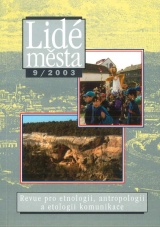Americký mýtus a amerikanizace Československa po první světové válce
DOI:
https://doi.org/10.14712/12128112.4244Abstrakt
Ever since its inception the USA has attracted the interest of Europeans. In the course of time the American democracy and its ideals as well as the wealth and large spaces of America became a source of fascination and desire of millions of people throughout the world. Since the second half of the 19th century a large number of emigrants from Western and Northern, and later also Central, Eastern and Southern Europe had come to the USA. Millions of them saw their dreams come true. They appeared in a country of big life opportunities, a country of prosperity, the "American paradise," as it was often called. For millions of other people in the world America will stay a mythical country of affluence, a "land flowing with milk nnd honey," a country of big opportunities and potential success and career from the "shoeshine boy to the millionaire." This image will be to a large extent strengthened by the Americans themselves, recent emigrants and current citizens of th USA. ln inter-war Czechoslovakia America was much popular, especially in the 1920s. lmmitations of models of American democracy, gratitude for help in the establishment of the country, exchange of economic experiences and development of trade were a perfect, beneficial impetus in the promotion of everything American. This created a favourable atmosphere in bilateral relations on the threshold of independent Czechoslovakia. The American official circles, Czechoslovak authorities and American Czechs and Slovaks played a very active role in this. The fascination by America and everything American in Czechoslovakia strongly ebbed in the second half of the 1920s. The clash of expectations it had evoked among Europeans earlier (the hopes of aid to the post-war Europe and closer cooperation) with reality (a pragmatic policy of the 'USA, the necessity of repaying the debts, etc) brought about great diseanchantment also among Czechs and Slovaks. This undermined the belief about an idealistic and philanthropic America, readily helping those in need. Czechs took an interest in the American manufacturing system, the productivity of work, technologies and various technological innovations. However, great admiration for America after a brief time gave way to a realistic approach. Even the fascination with American cars gave way to reality. In order to protect its own industry Czechoslovakia introduced quotas and curbed import of cars from the USA. However, Czechoslovakia was not able to defend itself aga nst the Hollywood film in its conquest of not only Europe, bul the whole world. The devastating recession in the 1930s brought about serious economic, financial and social repercussions in the USA. It also influenced its foreign policy, pushing it to a more nationalist and isolationist course. The recession also became a deadly danger to the idyllic idea of a rich Amcrica and Americans convinced about their superiority and the perfection of the economic and political style of the USA. This was the beginning of a slow, but irrevocable erosion of the American myth.
Stahování
Publikováno
Jak citovat
Číslo
Sekce
Licence

Tato práce je licencována pod Mezinárodní licencí Creative Commons Attribution-NonCommercial-NoDerivatives 4.0.


